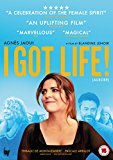Eye For Film >> Movies >> I Got Life! (2017) Film Review
I Got Life!
Reviewed by: Jane Fae

Sometimes, reading another reviewer's synposis, I find myself wondering if they watched the same film. Not often. But that was very much the case of Aurore/I Got Life!, a charming, delightful, funny saga of love, life and menopause.
At any rate, I Got Life! is, superficially – according to IMDB – the story of Aurore (Agnès Jaoui),who is “separated from her husband, has just lost her job and been told that she is going to be a grandmother. She is slowly being pushed to the outskirts of society, but when she accidentally runs into the great love of her youth, she puts her foot down and refuses to be relegated to the scrapyard”.

Well, perhaps. I'd be fibbing if I said that didn't happen. But that feels almost insult to the film. For this is a film about sisters – and mothers and daughters and friends and grandmothers – who are doing it for themselves. Yes, there is romance and even a little bit of sex. It is a French film, after all.
Otherwise, it is about the relationships between a group of women of various ages, mucking in together, doing their best to help one another survive the vicissitudes of life.
Sure: there are men wandering in and out of shot: some, like the new bar-owner who thinks it appropriate to rename Aurore “Samantha” because it sounds sexier, or the random passer-by who remarks on Aurore's physical attributes, are dicks. Others, Aurore's ex-husband Nanar (Philippe Rebbot) or the-one-who-got-away, the dishy, gorgeous “Totoche” (Thibault de Montalembert) range from harmless to phwoar!
But as films go, I Got Life! Does not just pass the Bechdel test. It aces it. There is even, in one small scene, an almost unheard of thing: a reference to and succinct explanation of “intersectionality”. This is the idea that minorities are not so much competing to see which can claim to be most oppressed, but that all minorities – women, LGBT, religious, ethnic – have far more in common through their shared oppression.
At its heart, of which it has much, are Aurore, her daughters, Marina (Sarah Suco) and Lucie (Lou Roy-Lecollinet) and best friend Mano (Pascale Arbillot). The real drama in her life is not the loss of job or the will-she-won't-she-rekindle-an-old-flame conundrum, as the passing on of a much more eternal flame: as Aurore enters menopause and coincidentally finds herself out of work and out of a relationship, so Marina declares herself pregnant.
This, as the film highlights, is traditionally the point at which women start the downward march towards death. They are no longer sexually useful and are now, therefore, creatures to be pitied rather than celebrated. I Got Life!, which takes its title from the Nina Simone song of the same name, turns that presumption on its head.
In a scene that is touching and genuinely tear-inspiring, Aurore dances alone to that track. Yet she is not alone, because she has her daughters and, through them, life carries on. Menopause is NOT the end of the road, but the middle, the pivot, the beginning of a new phase.
Along with the limiting synopsis, I expect I Got Life! will find itself dismissed as a romcom, which it is not. Domcom? A celebration of the small domesticities of life? Or something else entirely. Social comedy? Watching it, I found myself reminded of another film which I reviewed recently, Venus, which is a story about a trans woman told not from the perspective of the outsider looking in, but from that of a trans person just living their everyday life. I loved that about Venus, that it was that very rare thing, a film about a minority that that minority could identify with.
As Venus, so I Got Life! This is a film from the perspective of women: and not just one perspective, but many, which is what gives it its richness. Hardly surprising to find it is directed by a woman, Blandine Lenoir, who has a long career as writer, director and actress, as well as strong views on the role of women in society.
Aurore, as she explains in an interview with Mediapart does not identify as feminist: but by the end of the film she has come to understand the importance of collective action.
A great film if you are looking to feel just a little better about yourself and life in general, and not bad, either, if you are looking for a little advice on direction to take.
Reviewed on: 30 Jun 2018

















